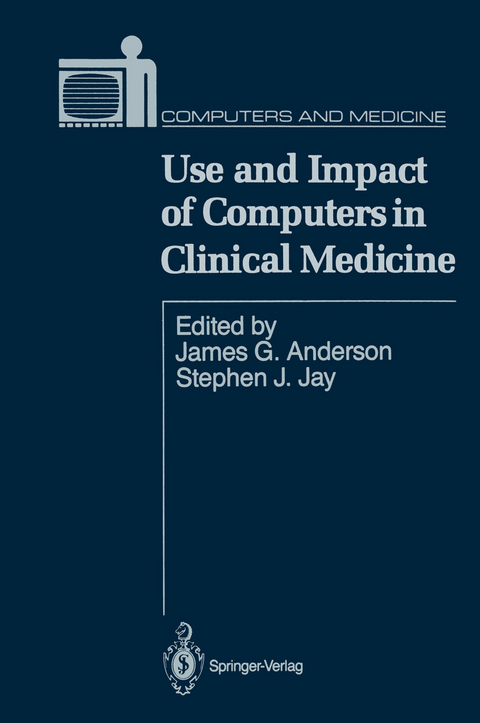
Use and Impact of Computers in Clinical Medicine
Springer-Verlag New York Inc.
978-1-4613-8676-6 (ISBN)
Computer technology has impacted the practice of medicine in dramatic ways. Imaging techniques provide noninvasive tools which alter the diag nostic process. Sophisticated monitoring equipment presents new levels of detail for both patient management and research. In most of these high technology applications, the computer is embedded in the device; its presence is transparent to the user. There is also a growing number of applications in which the health care provider directly interacts with a computer. In many cases, these applica tions are limited to administrative functions, e.g., office practice manage ment, location of hospital patients, appointments, and scheduling. Nev ertheless, there also are instances of patient care functions such as results reporting, decision support, surveillance, and reminders. This series, Computers and Medicine, focuses upon the direct use of information systems as it relates to the medical community. After twenty five years of experimentation and experience, there are many tested ap plications which can be implemented economically using the current gen eration of computers. Moreover, the falling cost of computers suggests that there will be even more extensive use in the near future. Yet there is a gap between current practice and the state-of-the-art.
I. Introduction.- 1. The Diffusion of Computer Applications in Medical Settings.- 2. What Makes Doctors Use Computers?: Discussion Paper.- 3. Medical Technology: Assessment, Adoption, and Utilization.- II. Adoption: The Physician’s View of Computers in Medicine.- 4. The Influence of Medical Values and Practices on Medical Computer Applications.- 5. What do Professional Persons Think About Computers?.- 6. An Analysis of Physician Attitudes Regarding Computer-Based Clinical Consultation Systems.- 7. Physician Attitudes Toward Applications of Computer Database Systems.- 8. Why Doctors Don’t Use Computers: Some Empirical Findings.- III. Diffusion of Medical Computer Applications.- 9. Diffusion of Innovations: An Overview.- 10. Embracing or Rejecting Innovations: Clinical Diffusion of Health Care Technology.- 11. Computers and Clinical Judgment: The Role of Physician Networks.- 12. Physician Communication Networks and the Adoption and Utilization of Computer Applications in Medicine.- IV. Utilization of Clinical Computer Systems.- 13. Clinical Computing in a Teaching Hospital.- 14. Implementing Computerization in Hospitals: A Case Study of the Behavioral and Attitudinal Impacts of a Medical Information System.- 15. Evaluation of a Computerized Drug Review System: Impact, Attitudes, and Interactions.- 16. A Structural Model of the Impact of Physicians’ Perceptions of Computers on the Use of Hospital Information Systems.- 17. Physician Utilization of Computers in Medical Practice: Policy Implications Based on a Structural Model.- 18. User Reaction to PROMIS: Issues Related to Acceptability of Medical Innovations.- 19. Do Hospital Staff Interfere with Computer System Implementation?.- V. Impact of Computer Systems on Clinical Practice.- 20. Medicine and the Computer: ThePromise and Problems of Change.- 21. Computers and Clinical Medicine: Implications for the Practice of Medicine.- 22. Hospitals of the Future.
| Reihe/Serie | Computers and Medicine |
|---|---|
| Zusatzinfo | XIII, 362 p. |
| Verlagsort | New York, NY |
| Sprache | englisch |
| Maße | 155 x 235 mm |
| Themenwelt | Mathematik / Informatik ► Informatik ► Datenbanken |
| Mathematik / Informatik ► Informatik ► Theorie / Studium | |
| Mathematik / Informatik ► Informatik ► Web / Internet | |
| Informatik ► Weitere Themen ► Bioinformatik | |
| Medizin / Pharmazie ► Gesundheitswesen | |
| Naturwissenschaften ► Biologie | |
| Technik ► Medizintechnik | |
| ISBN-10 | 1-4613-8676-4 / 1461386764 |
| ISBN-13 | 978-1-4613-8676-6 / 9781461386766 |
| Zustand | Neuware |
| Haben Sie eine Frage zum Produkt? |
aus dem Bereich


